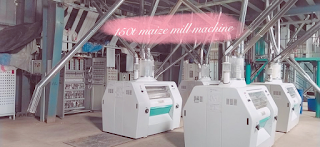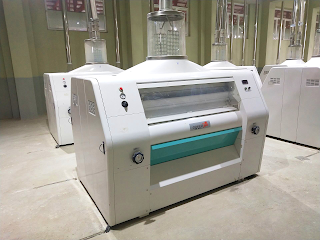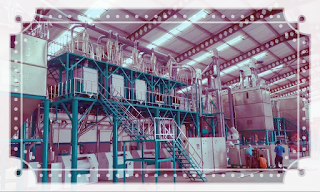Advantages and disadvantages of wheat wet cleaning technology------Hongdefa
The wheat wet cleaning process is to add a wheat washing machine on the basis of the dry cleaning process.
The stone washing machine is the main equipment of the wheat wet cleaning process. It can separate the impurities such as shoulder stone, mud block, and insect ate wheat grain in wheat; through washing wheat, it can also remove soil, pesticide, microorganism, insect eggs, and other pollutants on the surface of wheat and embedded in the abdominal ditch. It can also increase the water content of wheat.
Its disadvantage is that water consumption is large, the sewage needs to be purified, and the workshop is humid. It is easy to accelerate the bacterial reproduction in the equipment, transportation equipment, and wheat warehouse.
The main advantages of the wheat wet cleaning process are recognized as the main part, which is to remove stones and water. Therefore, when the specific Gravity classification stoner and computer watering machine appeared with lower cost, easier operation, higher efficiency and precision, the wheat washing machine market was almost completely replaced by them.


Moisture Damper Gravity Classification Stoner
Our Hongdefa wheat flour mill machine’s cleaning section uses Moisture damper and Gravity Classification Stoner.
One of the important advantages of the wheat washing machine is that it can completely remove the dust adhered to the surface of the wheat grain and the inside of the belly ditch and the light miscellaneous mixed in the wheat stream. This function can not be achieved by any advanced single cleaning machine.
Research and practice have proved that the dust adhered on the surface of wheat has the greatest pollution to wheat flour. When the non cleaned wheat enters the first grinding machine and is grinded for the first time, its particle size is smaller than that of the wheat in the product, and it is fragile and miscellaneous, so it can enter the front wheat flour system unimpeded through screening without any further grinding, while the medium and low particles in the middle and back roads are relatively low.
On the contrary, wheat flour and by-product bran are rarely contaminated. This is that many large factories with excellent equipment and advanced technology can not produce high-precision wheat flour, while some small factories can produce high-grade wheat flour with a similar proportion only because of the addition of wheat washing equipment, although the equipment and technology of some small factories are relatively simple.
After wet cleaning, the following process indexes can be achieved:
① the ash content of wheat should be reduced by 0.02% - 0.04%;
② the broken wheat produced should not exceed 0.5%;
③ the moisture content of wheat should meet the requirements of flour milling, and there is no water drop on the surface of Wheat;
④ the sand content after washing should be less than 0.03% (when the sand content of wheat entering the machine ≤ 0.3%);
⑤ wheat grains infected with pathogens (Hyde disease, scab, and ergot)
⑥ the amount of dry matter washed away should not exceed 0.3% of the total weight of wheat, and the sewage purification treatment should meet the requirements of environmental protection.
There is a big difference in ash content, whiteness and microorganism between wheat flour processed by washing wheat and that without washing wheat. It can be seen from the data measured by relevant research: the dry cleaning process can reduce the ash content (dry basis) of wheat mill by 0.09% on average, and the wet cleaning process can reduce the ash content (dry basis) of wheat flour by 0.17% on average, which is almost twice as much as that of dry cleaning; the ash content of wheat flour is also decreased more obviously, with an average decrease of 0.027% under the premise of unchanged flour proportion, and the whiteness is slightly improved. The unfavorable factor is that the bacterial content of wheat flour produced by wet cleaning is slightly increased.
Compared with the dry cleaning process, the disadvantages of the wet cleaning process are also more prominent: first of all, wheat washing needs to consume a lot of tap water, the sewage needs to be purified, and the water consumption is 1 ~ 2 times of the wheat flow. In the current situation of frequent urban water shortage and high water price, for small and medium-sized wheat flour milling enterprises, it is not only difficult to bear the expensive water cost but also the discharged sewage can not be completely purified.
Secondly, the wheat washing water contains a large number of organic impurities such as wheat husk, insect-damaged wheat grains, and broken wheat grains, which will cause the loss of useful materials without treatment.
In order to solve these two problems, we must take relative measures, and the investment should not be too large and the cost should not be too high. Otherwise, it will not work in the wheat flour industry with low profit.


Purifier
The wet cleaning process of wheat has gone through the process from use to elimination, and its cleaning effect is in favor of its cleaning effect: it can shorten the process flow, reduce the occupation of equipment, and improve the quality of wheat flour; it is eliminated because it consumes a lot of water, wastes wheat and causes certain pollution to the environment. The use of dry cleaning or wet cleaning process has a lot to do with the powder road and other milling equipment, but the role of the wet cleaning process has its own advantages.
Wheat flour milling enterprises, especially small and medium-sized wheat flour milling enterprises, can balance the advantages and disadvantages according to their location, water supply, and drainage conditions, process requirements and spatial location, and reasonably use the wheat wet cleaning process.
If you want to get high quality wheat flour, you can contact us for wheat flour mill machine.
Website:www.hdfmill.com Tel:+8615028156279 Email:miya@hdfmill.com
#Hongdefa #wheat #wheatflourmill #flourmill #wheatcleaningmachine #wheatflour #Hongdefawheatmill







































